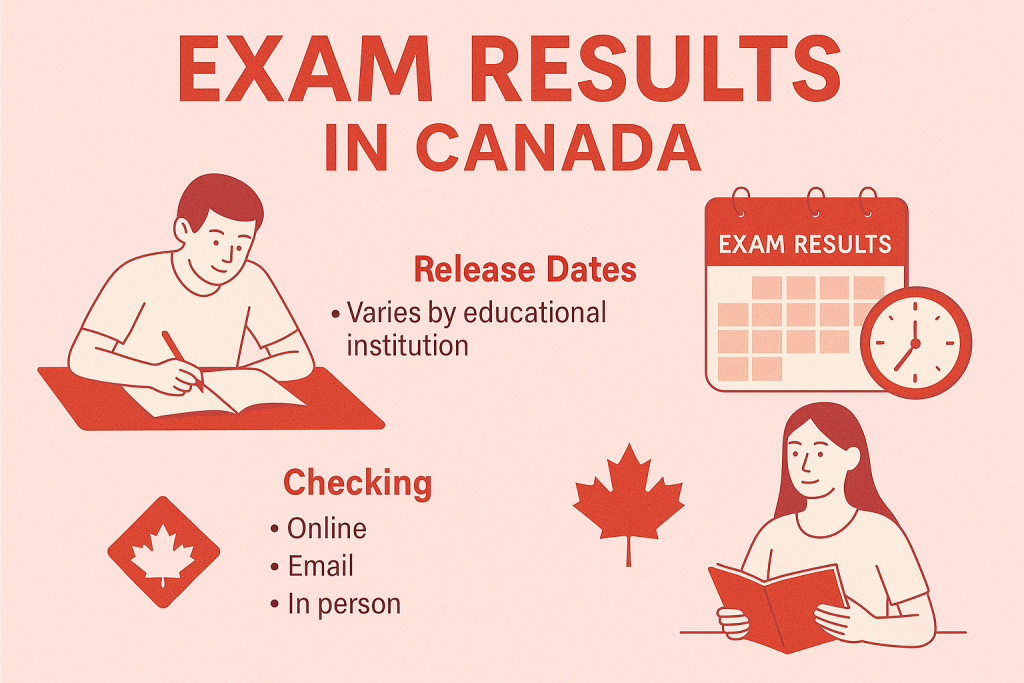Exam Results in Canada – When They Come Out, How to Check, and How to Stay Positive
Exams in Canada can feel like a rollercoaster – full of ups and downs. Whether you’re a high school student waiting on provincial exam scores, a university student biting your nails over GPA, or someone preparing for international tests like IELTS, the result day always comes with that mix of excitement and anxiety. Let’s walk through how exam results work in Canada, when they’re released, and how to keep yourself calm, focused, and motivated.

🎓 High School Exam Results in Canada
In Canada, education is handled by provinces, so the exam and result system can vary. But here’s the general breakdown:
- Provincial Exams:
Provinces like British Columbia and Alberta hold standardized provincial exams (Grade 12 is the big one). These results are usually released in July, after the school year ends. - Ontario (OSSD):
Ontario students get their Ontario Secondary School Diploma (OSSD) results from schools, often in late June. For those applying to university, the Ontario Universities’ Application Centre (OUAC) also updates student portals with results. - Quebec (CEGEP):
Quebec is unique – after high school, students attend CEGEP. Results for final exams and R-Scores are usually posted by early summer.
The good part? High schoolers in Canada usually get results quickly compared to some countries.
🎓 University Exam Results in Canada
Canadian universities run on a semester or trimester system. Typical schedule:
- Fall Semester: September – December → Results in late December or early January.
- Winter Semester: January – April → Results in May.
- Summer Semester: May – August → Results by end of August.
Professors post grades on the student portal, and students get a letter grade (A, B, C, D, F) plus a GPA score. The GPA (usually out of 4.0) is what really matters for scholarships, grad school, and job applications.
🗓️ How to Check Exam Results
Canadian students have it easy when it comes to checking results:
- Online portals: Most schools and universities have secure logins where you can check grades.
- OUAC (Ontario): For Ontario high schoolers applying to university, the OUAC portal is where results appear.
- Emails & transcripts: Many institutions email students once results are live.
- In-person reports: High schools still hand out report cards.
😰 The Fear Before Results – How to Deal With It
Honestly, waiting for results is often harder than the exam itself. You keep refreshing the portal, your heart pounds, and your mind plays worst-case scenarios. Here’s how Canadian students can handle that stress:
- Stay realistic: No one exam defines your entire future. Even if you don’t get into your first-choice program, Canada has plenty of pathways – colleges, transfer programs, bridging courses.
- Talk it out: Share your fears with parents, friends, or even teachers. You’re not alone in this.
- Do something fun: Don’t just sit around worrying. Watch a hockey game, go for a Tim Hortons run, or hang with friends.
- Avoid comparison: It’s tempting to compare scores with classmates, but remember – everyone’s journey is different.
📘 Best Study Resources & Books in Canada
For Canadian students, these are go-to resources:
- High School (NOVA, OSSD, etc.):
- Nelson study guides (widely used in Ontario).
- Provincial past papers (BC, Alberta).
- Prep books from Indigo or online (Barron’s, Pearson).
- University Students:
- University libraries (tons of free digital resources).
- Old exams (most universities have archives).
- Peer study groups.
- International Exams (IELTS, TOEFL, MCAT, LSAT, etc.):
- “The Official Cambridge Guide to IELTS.”
- Kaplan prep books (for MCAT, LSAT, GRE, GMAT).
- Online practice platforms like Magoosh.
📝 How to Prepare Smart for Exams in Canada
Canadian students balance study with life pretty well. Here’s what works:
- Make a plan: Don’t just cram. Break work into daily pieces.
- Practice old exams: Most universities upload past exams. Use them!
- Stay healthy: Hockey, walks, gym – exercise keeps your brain sharp.
- Sleep well: Pulling all-nighters before exams rarely works. Sleep boosts memory.
- Ask for help: Don’t hesitate to ask teachers, TAs, or professors. Canadians are generally approachable and supportive.
🔥 Motivation Hacks
When you’re tired of studying or nervous about results, try these:
- Small wins: Reward yourself after finishing a topic (coffee, snack, short YouTube break).
- Positive mindset: Imagine yourself smiling after opening results – it pushes your brain to work harder.
- Peer support: Studying with friends keeps you accountable.
- Long-term vision: Whether it’s becoming a doctor, engineer, artist, or entrepreneur, remind yourself why you’re studying.
🌏 Why Canada’s Exam System Works
Canada’s system is built to support students, not just pressure them.
- Multiple pathways: Even if grades aren’t great, students can still attend college, transfer later, or pursue apprenticeships.
- Holistic admissions: Universities don’t only look at grades. Extracurriculars, essays, and references also matter.
- Transparency: Results are clearly posted online and easy to access.
- Balance: Students enjoy sports, clubs, and social life alongside academics.
📝 Final Words
Exam results in Canada matter, sure – but they aren’t the final verdict on your life. Whether you’re a Grade 12 student checking your provincial scores, a uni student waiting for GPA, or an international test taker, remember this:
Results show your performance at one moment, not your potential forever.
If you do well – celebrate, maybe grab some Timbits! 🎉
If you don’t – don’t stress. There are countless opportunities in Canada’s flexible education system.
So keep working smart, stay motivated, and know that every result – good or bad – is just one step in your journey.